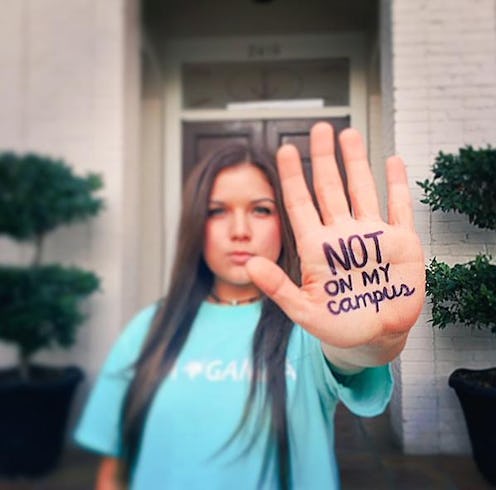News
Can Fraternities Stop On-Campus Sexual Assault?

Recent high-profile sexual assault allegations, such as the ones at Columbia and University of Virginia, have left many wondering what is being done to curb sexual assault on college campuses. Fraternities (and all of Greek life) are coming under fire for creating an environment that promotes sexual assault, which is why the Interfraternity Council at the University of Texas introduced #NotOnMyCampus, an initiative to end sexual assault on campus.
Not On My Campus was launched at UT on March 23rd, although it was started at Southern Methodist University in late January 2014. Three Greek members at UT, Edwin Qian, Ellen Cocanougher, and William Herbst, got together to start Not On My Campus to help put an end to sexual violence on campus. The campaign began with a strong social media push, where students tweeted pictures of themselves with the words "Not On My Campus" written on their hands. They also circulated a pledge that supporters could sign. The initiative really kicked off at Round Up 2015, UT's huge spring party (it's been called the biggest annual Greek event in Texas, just to give you an idea of just how massive this party is) where attendees were each given wristbands with #NotOnMyCampus printed on them. NOMC is also linking up with Be Vocal and Voices Against Violence, two other anti-violence campus organizations, "to create something of a sexual assault outreach conglomerate."
Not On My Campus has already picked up a lot of steam, with UT's President and football players taking part in the pledge. Many are applauding NOMC's efforts at reducing sexual assault, and Cocanougher said that Not On My Campus has already helped students feel "more comfortable and less alone." NOMC volunteers are hoping that creating a more supportive environment will help survivors feel safe to report assault. Although it's too early to tell what type of impact Not On My Campus will have in preventing assault in the long-run, its volunteers claim that some survivors have disclosed that they feel more willing to discuss what happened to them.
Still, not everyone on campus is 100 percent on board. First off, plenty of people are skeptical about the choice to use a huge, booze-fueled fraternity party as the occasion to push a sexual assault awareness campaign, because that is the exact type of environment that fuels assault in the first place. Depending on how you look at it, a college party is either the worst place to try to launch a campaign like this, or the exact place to start.
Others are concerned that #NotOnMyCampus could turn into an instance of slacktivism. As one student told The Daily Dot, "They printed Not On My Campus on the Round Up wristbands, but do people really understand what that meant?" Which is a fair point — did the creators of NOMC and the wristbands have an action plan in place for students if they witnessed a potentially dangerous situation at the party, or did it stop at the wristbands? Finally, some are uneasy with the fact that the movement itself was started by members of Greek Life, who skeptics say are not adequately acknowledging the link between sexual assault and fraternity life, and are perhaps seeking to sweep it under the rug while gaining some positive PR.
Despite the criticism, the members and founders of NOMC maintain that they're committed to ending sexual assault at UT, citing upcoming programming, like a screening of The Hunting Ground, a documentary about rape on college campuses, informational pamphlets to hand out to other schools, self-defense classes, and more. And, at the very least, many are impressed that students at UT are taking it upon themselves to start a dialogue, rather than turning the other cheek and hoping the problem goes away on its own.
I think, even though the choice of a party was perhaps hypocritical and suspect, this is a step in the right direction. Hopefully Not On My Campus will continue its momentum and actually follow through on these programs, and bring about some real change in the campus culture. Let's hope that the positivity continues beyond the month of April (which is Sexual Assault Awareness Month) and that other campuses around the country take note.
Images: Krishna, Belle Bankston / Twitter